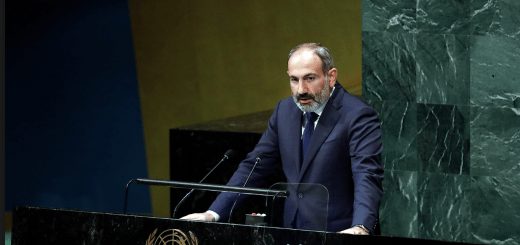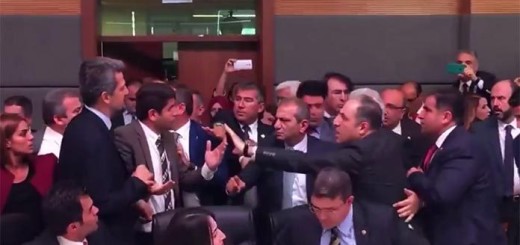By Denying the Armenian Genocide, Turkish Leaders Publicize it Even More
More than a century after the mass crime of Genocide against Armenians, Assyrians and Greeks, most Turks still feel self conscious as April 24 approaches and whenever someone refers to their Crime Against Humanity.
Many Turkish officials and journalists feel compelled to defend their country’s tarnished reputation by trying to cover up the Genocide committed by their ancestors. By doing so, they automatically associate themselves with the guilt of their forefathers and in turn become guilty themselves for denying one of the most heinous crimes in the history of mankind.
Why would Turkish Foreign Minister Mevlut Cavusoglu, on April 15, 2019, falsely claim that Turkey “has not committed any genocide” in its history? How many leaders of other countries have made such a statement? Cavusoglu knows well that the Ottoman Turks did commit Genocide as he is desperately trying to conceal their crimes. Cavusoglu and his fellow denialists do not seem to realize that the more they proclaim their innocence, the more they affiliate themselves with the Genocide and become accessories to that barbaric crime.
Each time Turkish President Recep Tayyip Erdogan or his underlings talk about the Genocide, even in a dismissive manner, they are actually publicizing worldwide the facts of the Genocide and informing everyone that Turks are accused of committing Genocide.
Interestingly, Cavusoglu warned that “the Turkish government will not stay silent against some countries trying to lecture Turkey on history.” This is exactly what Armenians want him to do. The more he talks about the Genocide, the more he exposes the Turkish crime to the world. Cavusoglu and other Turkish denialists find themselves in the ironic situation of “damned if you do, and damned if you don’t.” In other words, if they remain silent against the accusations of Genocide, they would be acknowledging it, and if they deny it, they would be spreading the news about their historic crime. There is no positive outcome for them. They are caught in the horns of a serious dilemma.
In early April, at a NATO meeting in Antalya, Turkey, Cavusoglu criticized French President Emmanuel Macron for declaring April 24 as a National Day in France for the commemoration of the Armenian Genocide. By lashing out at Pres. Macron, the Turkish Foreign Minister made the situation even worse for his own country. In protest, a French Parliamentarian walked out of the NATO meeting, which was covered by the worldwide media, further publicizing the Armenian Genocide.
This incident caused some hateful Turks to threaten the life of the French Parliamentarian, which further disseminated the true facts of the Armenian Genocide.
Another example of Turkish self-consciousness is the article by commentator Ozan Ceyhun in the Daily Sabah newspaper. He correctly wrote that “April 24 is used as a day for ‘getting even,’ by those who do not wish to see Turkey as an EU member due to various reasons, those who do not wish to see it become stronger in the region, or countries like the U.S. that want to see Turkey as a dependent state.” My response is that no one wants to see a brutal and unrepentant country as a member of international military and economic alliances. Turkish leaders are the ones forcing themselves out of such alliances by behaving in an uncivilized and undemocratic manner. They have no one else to blame but themselves.
Ceyhun wonders why no one cares about the opinions of “Armenians living in Turkey.” The answer is very simple. Armenians in Turkey, having survived the Genocide and many other repressions since then, know all too well that if they dared to say anything negative about Turkey’s oppressive regime, they will be locked up, if not killed.
The Turkish commentator then shamelessly mentions Armenian journalist Hrant Dink who was assassinated by a Turk for expressing himself on Turkish-Armenian relations. Ceyhun selectively quotes from Dink as stating that outsiders should not meddle in the “events” that happened in the past and that this issue should be resolved between Armenians and Turks. Dink had made many statements which were often contradictory depending on whether he made them while he was inside or outside Turkey.
It suits Turkish denialists to quote statements that third parties should not meddle in the Armenian-Turkish issue. If it were not for the Armenian Diaspora lobbying the international community for decades, the Armenian Genocide would have been forgotten long ago. Furthermore, Ceyhun prefers that outsiders listen to the views of Turkish Armenians who are suppressed and are unable to express their honest opinions on the Armenian Genocide. As immediate descendants of the Genocide, they know exactly what happened to their ancestors, but they cannot talk about it openly, fearing for their lives.
Just as irritating are the Azerbaijani denials of the Armenian Genocide. Fortunately, it is easier to deal with the Azeris as they are not as powerful as Turkey and Armenians have already shown their power by recovering their historic territory of Artsakh from Azerbaijan. If Azeris do not behave and continue to insult Armenians by their denials of the Armenian Genocide, Armenia’s leaders may halt the negotiations with Azerbaijan and incorporate Artsakh in the Republic of Armenia.







